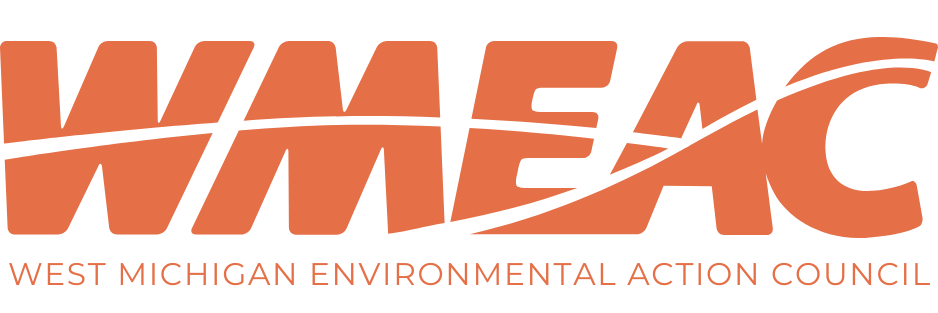By Tanya Cabala, WMEAC Lakeshore Outreach Organizer
Last month, West Michigan was blessed with the presence of an inspiring and healing teacher – Dr. Robin Wall Kimmerer, author of Braiding Sweetgrass: Indigenous Wisdom, Scientific Knowledge, and the Teachings of Plants. Published in 2015 to little fanfare, her book has been making headlines in the last few years as its message gains traction. It was a choice of a virtual WMEAC book chat discussion I led a few years back, when the pandemic turned nearly everything virtual. None of us who participated were particularly taken by the book’s title and cover – it looked pretty “science-y” and maybe not very relatable. But we were very wrong. By the time we were done, we all termed the book “transformative,” changing the way we understood the world, and our relationship to it going forward. When I learned Dr. Kimmerer would be at GVSU’s Allendale campus on November 8, I made sure to be there!
The presentation was titled, “What Does the Earth Ask of Us?” Attendance was standing room only, mostly students, and there were two virtual livestream viewing options as well. I was surprised and happy to see nearly thirty people I knew from my work along the lakeshore in the audience. Before the event started, I put one of my favorite polished Petoskey stones in the famed author’s hands.
You would not know Dr. Kimmerer was a national bestselling author or a preeminent university professor if you met her on the street or in a local cafe. She is a petite woman, a grey-haired mother and grandmother, with a kind face and smile. A member of the Citizen Potawatomi Nation, she is a distinguished teaching professor at SUNY College of Environmental Science and Forestry, and founder and director of its Center for Native Peoples and the Environment.
Dr. Kimmerer led with her story of loving plants as a child and her challenging path to merge that love with a career in science. She showed us an image representing a dish with one spoon and explained the Indigenous concept of earth, the dish, with just one spoon for us all to use to share its resources. She also told of Sky Woman who fell to the earth with a branch of the tree of life and was cared for by animals who sacrificed to make land for her, Turtle Island, and how she in turn, gratefully gave her seeds from the tree of life to plant on the earth. This was a beautiful way to answer her question: Gratitude and reciprocity is what the earth asks of us.
Dr. Kimmerer said for the Anishinaabe, whose land we live on in West Michigan, the land is their identity while Western peoples have viewed the land as a “commodity warehouse” or more recently, as providing “ecosystem services.” She told us the earth is “full of relatives, the connection to our ancestors who brought us here and kept this place, what it will become, the teacher, the library, the source of knowledge, the pharmacy, the healer, where our wellness comes from.” She said we have a choice: “We can see the earth as a source of belonging or a source of belongings. Dr. Kimmerer explained how language, such as using “it” as a way of objectifying the inhabitants of earth, “linguistic imperialism,” she termed it, has been used to be able to inflict great harm.
A call for a shift in perspective echoed throughout her talk. Dr. Kimmerer urged us to embrace “two-eyed seeing,” a holistic approach that recognizes the interconnectedness of all living beings. She drew attention to a 2019 UN report on biodiversity, aligning plant diversity hotspots with Indigenous cultural knowledge—underscoring how this was not a coincidence – that places of higher biodiversity were maintained due to Indigenous scientific principles in play.
In today’s world, with such overwhelming and numerous environmental crises, Dr. Kimmerer’s teachings offer a beautiful and respectful way to be in the world—”a deep remembering of a different relationship to the land.” She urged us to find our gift, what we have to offer to the world, and to work with others. Our journey may be long, she cautioned, but “being patient does not equate to complacency. We are to raise gardens, raise good children, and when necessary, raise a ruckus.” And then she told us the time is now. Dr. Kimmerer’s presentation was recorded and is available to view on GVSU’s YouTube channel: Robin Wall Kimmerer – What Does The Earth Ask of Us?

